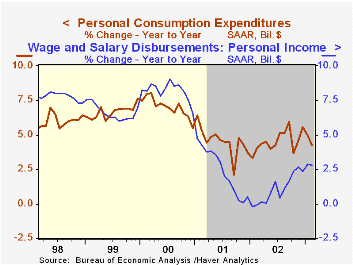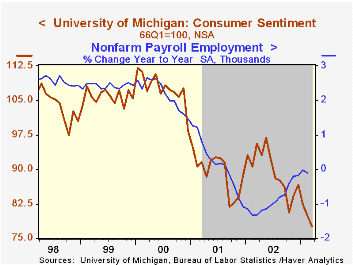 Global| Mar 28 2003
Global| Mar 28 2003Personal Spending Flat Again, Income Up
by:Tom Moeller
|in:Economy in Brief
Summary
Personal consumption expenditures were flat in February for the second consecutive month. Consensus expectations were for a 0.2% decline. Adjusted for price inflation, PCE fell 0.4% and that followed a 0.2% decline in January. Despite [...]

Personal consumption expenditures were flat in February for the second consecutive month. Consensus expectations were for a 0.2% decline. Adjusted for price inflation, PCE fell 0.4% and that followed a 0.2% decline in January.
Despite the two consecutive months of decline in real PCE, the average level of spending so far in 1Q is up 1.5% (AR) from 4Q. This rise is due to a large 1.0% December gain which raised the starting point for the quarter.
Spending on durable goods dropped 2.2% last month (-1.4% y/y) with lower light vehicle sales. The decline followed a 4.9% January slump. Nondurable goods spending was down just slightly (4.8% y/y) following a 1.3% January surge. Spending on services rose 0.5% (5.1% y/y).
Personal income rose slightly more in February than Consensus expectations for a 0.2% gain. January was revised up. Growth in wages and salaries was a relatively firm 0.3% (2.8% y/y) following an upwardly revised 0.4% gain in January. During the last ten years there has been a 65% correlation between the y/y growth in wages and the growth in personal spending. That's double the correlation between spending growth and disposable income.
Disposable personal income rose 0.2% (4.6% y/y) following a 0.4% January rise. Personal tax payments fell 2.6% y/y due to last year's tax cuts.
The PCE price deflator rose in February by the most for any month since last April. Less food and energy the price deflator ticked 0.1% higher (1.4% y/y) following no change in January.
| Disposition of Personal Income | Feb | Jan | Y/Y | 2002 | 2001 | 2000 |
|---|---|---|---|---|---|---|
| Personal Income | 0.3% | 0.4% | 3.6% | 2.8% | 3.3% | 8.0% |
| Personal Consumption | 0.0% | -0.0% | 4.2% | 4.5% | 4.5% | 7.0% |
| Savings Rate | 4.0% | 3.8% | 3.4% | 3.7% | 2.3% | 2.8% |
| PCE Price Deflator | 0.4% | 0.2% | 2.3% | 1.4% | 2.0% | 2.5% |
by Tom Moeller March 28, 2003

The March reading of Consumer Sentiment from the University of Michigan fell sharply versus February. The 2.9% m/m decline to 77.6 was versus Consensus expectations for a reading of 75.0. The mid-month reading of sentiment was 75.0.
The index was at the lowest level since August 1993.
The index of current conditions and expectations both fell, but expectations fell just slightly.
Over the last 10 years there has been a 63% correlation between the level of consumer sentiment and the y/y change in real PCE. That correlation rose to 82% during the last five years.
The University of Michigan survey is not seasonally adjusted.It is based on telephone interviews with 250 households nationwide on personal finances and business and buying conditions. The survey is expanded to a total of 500 interviews at month end.
| University of Michigan | March | Feb | Y/Y | 2002 | 2001 | 2000 |
|---|---|---|---|---|---|---|
| Consumer Sentiment | 77.6 | 79.9 | -18.9% | 89.6 | 89.2 | 107.6 |
Tom Moeller
AuthorMore in Author Profile »Prior to joining Haver Analytics in 2000, Mr. Moeller worked as the Economist at Chancellor Capital Management from 1985 to 1999. There, he developed comprehensive economic forecasts and interpreted economic data for equity and fixed income portfolio managers. Also at Chancellor, Mr. Moeller worked as an equity analyst and was responsible for researching and rating companies in the economically sensitive automobile and housing industries for investment in Chancellor’s equity portfolio. Prior to joining Chancellor, Mr. Moeller was an Economist at Citibank from 1979 to 1984. He also analyzed pricing behavior in the metals industry for the Council on Wage and Price Stability in Washington, D.C. In 1999, Mr. Moeller received the award for most accurate forecast from the Forecasters' Club of New York. From 1990 to 1992 he was President of the New York Association for Business Economists. Mr. Moeller earned an M.B.A. in Finance from Fordham University, where he graduated in 1987. He holds a Bachelor of Arts in Economics from George Washington University.
More Economy in Brief
 Global| Feb 05 2026
Global| Feb 05 2026Charts of the Week: Balanced Policy, Resilient Data and AI Narratives
by:Andrew Cates






